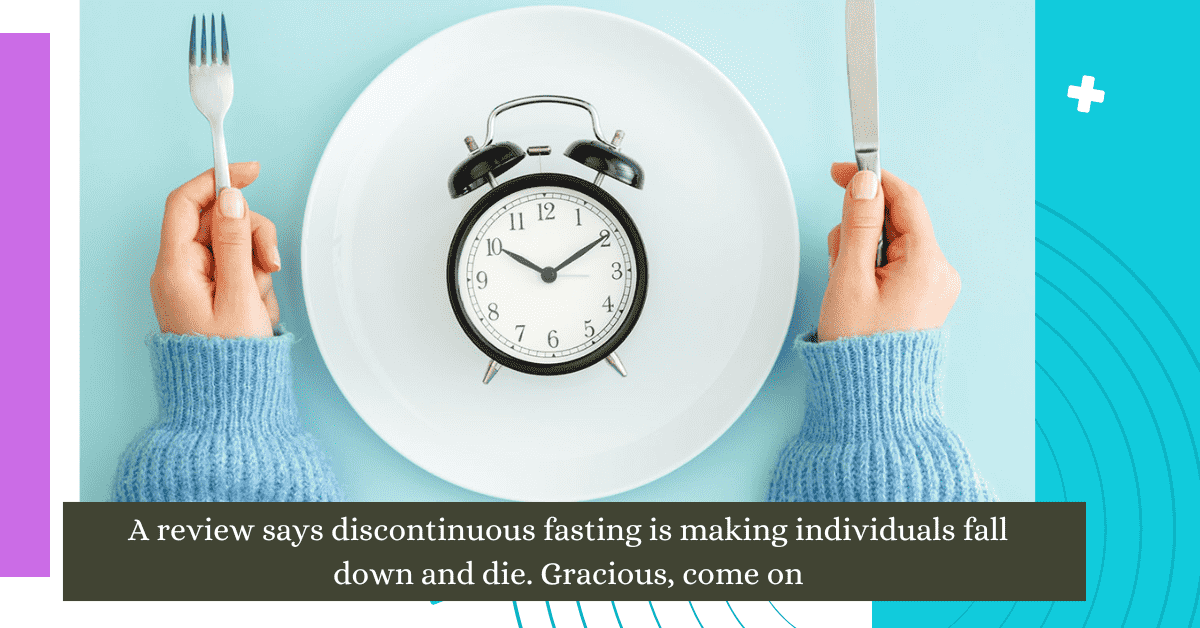Intermittent fasting heart disease

The news is wherever in my social news sources earlier today: A famous prevailing fashion diet is evidently deadly, logical examination says. In particular, an investigation discovered that caloric limitation, otherwise called discontinuous fasting, has a 91% higher gamble of death because of cardiovascular sickness.
But logical exploration doesn’t say that — and not exclusively would it be advisable for you not be stressed over this review, you ought not be squandering cerebrum glucose mulling over everything. In any event, including that 91% number, which you’ll recall, caused me torment, since I don’t figure this outcome ought to be recollected.
The review is a sort of wholesome exploration that is famously frail, and the present moment it’s just accessible as a public statement. It’s not satisfactory from the many, numerous news stories on the review whether columnists really saw the information that will be introduced at an impending examination meeting held by the American Heart Affiliation.
So how could I be, a science writer, without hesitation excusing this exploration? It depends on observational exploration, and one example from over 20 years of giving an account of wellbeing and medication is that one ought to be extremely doubtful of observational examination, particularly when it is about sustenance.
For this situation, specialists utilized a truly valuable exploration instrument, the Public Wellbeing and Sustenance Assessment Review (NHANES), an overview given to 5,000 individuals a year about eating and dietary propensities, as a beginning stage. These information were connected by the specialists to a different data set of passings. Both the study and the information base of passings are directed by the Habitats for Infectious prevention and Avoidance.
Such data sets permit analysts to rapidly verify whether dietary decisions appear to be related with medical issues. That is perfect, since they can assist researchers with setting the heading of more thorough examination that could require years. In any case, the responses that come from doing that are not really solid.
A contributor to the issue, the straightforward part, is that individuals noting reviews are not completely legit all of the time. More than that, particularly with food, we frequently misremember what we’ve eaten and how a lot. For example, we could think we followed our eating regimen and absolutely forget when we goofed.
In any case, the more serious issue is that individuals who decide to be on a tight eating routine, or the people who stay on it, may be on a very basic level not the same as the individuals who don’t in manners that we can’t gauge. Maybe individuals go on time-confined counts calories since they are stressed over their wellbeing. Maybe individuals who stay on such weight control plans have bodies that work uniquely in contrast to the people who can’t quick that long. Maybe, for reasons unknown, individuals who were on the eating regimen were not the same as the people who were not just by arbitrary possibility.
Analysts attempt to neutralize these potential outcomes by “controlling for” the gamble factors they know, similar to body weight and natural sex or orientation or age. Yet, the issue is that scientists can handle for the elements they can recognize.
How about we take a gander at a model where these peculiarities were influencing everything: the long term story of whether red wine forestalls cardiovascular failures. Initially scientists placed a “French Catch 22” — that red wine let Parisians down croissants, foie gras, boeuf bourguignon, raclette, and moules frites without the coronary episodes the specialists expected on the grounds that at the time they thought any high-fat eating routine expanded the gamble of coronary illness. This ultimately transformed into the possibility that extremely safe drinking (something like a glass of wine a day) gainfully affected coronary illness.
But as of late a few specialists have contended that this clear advantage isn’t there — it recently looked that way since moderate consumers were more grounded than others in manners scientists experienced issues estimating.
The best way to draw near to realizing this stuff without a doubt is to take an enormous gathering and relegate them haphazardly to, say, drink a glass of red wine a day or be nondrinkers. Then you know the two gatherings are most likely the equivalent, and on the off chance that they adhere to your directions you can perceive how red wine has an effect. Preferably, you would give them either counterfeit wine (a fake treatment) or genuine wine so even the members don’t have any idea what they’re getting.
That is known as a dazed randomized controlled preliminary, and frequently it makes the “fair so” stories researchers tell themselves vanish. For example, there was an astonishing story that Inuit individuals didn’t get coronary illness from high-fat eating regimens since they ate such a lot of fish. This prompted many examinations, including randomized preliminaries, that appeared to show taking fish oil enhancements would lessen coronary illness. However, better randomized examinations didn’t show this impact — until a remedy structure with a profoundly decontaminated fish oil succeeded. Notwithstanding, a few specialists likewise questioned that review, on the grounds that the fake treatment researchers utilized could have caused coronary episodes. Indeed, this is confounding, and that is the point: With sustenance, we should be truly cautious pretty much all we don’t have any idea.
In light of a theoretical of the new review gave to me by the American Heart Affiliation, which runs the gathering where the outcomes are being introduced, it seems the scientists didn’t inquire as to whether they were following time-confined slims down. What they did was search for individuals who just ate for a brief timeframe during the day in view of two reports to the study of what they ate.
“While useful, this study ought to be thought of as exploratory,” said Harlan Krumholz, a main master in the study of further developing wellbeing strategy at Yale. “We are as yet finding out about how individuals can improve their weight control plans, and this study is to a greater degree a call for more examination rather than something that ought to startle individuals who track down confined eating a helpful methodology.”
My own action item is that the review implies that everyday caloric limitation ought to be concentrated on more — however that’s what we knew. I don’t think it lets us know anything more about these eating regimens; it simply delineates the amount we have barely any familiarity with science. A few articles set that perhaps counting calories this way prompts more loss of bulk. Without a doubt, perhaps.
However, my other concern is that reviews like this, and press inclusion of them, can cause individuals more wary about the things that we to do be aware in medication. Individuals will generally consider science an interaction where researchers really do studies and figure out reality. In any case, it’s more precise to say that each study assists with making us somewhat less off-base, and somewhat more sure about what reality may be. We live in an immense domain of murkiness in which we have tracked down dispersed diamonds of truth.
This was a slick finding that ought to advise individuals working in nourishment to look harder at this theme. For every other person, it doesn’t actually express anything by any means.

